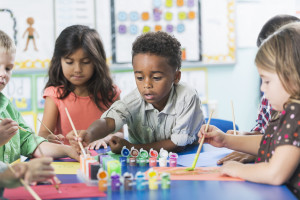
Goodwin recalls that it’s been 20 years since the director of a popular weight-loss program revolutionized our understanding of the long-lasting impact of emotional trauma by observing that nearly half his patients had experienced such difficulties in childhood as being abused, witnessing domestic violence, or having an incarcerated parent. Perhaps these “adverse childhood experiences” contributed to their overeating—and other risky behaviors—as adults.
Brain research has supported this proposition, uncovering brain abnormalities that would make it hard to regulate emotion and concentration—and thus make it hard to learn—in people suffering from chronic stress or post-traumatic stress disorder.
Does this mean students who have suffered adverse childhood experiences are doomed to be poor learners? Not necessarily. Goodwin sees hope for traumatized students in recent efforts to teach coping skills like relaxation, social problem-solving, and conflict resolution because these techniques have been shown to counteract the effects of trauma.
And then there are those specials. Studies have shown that music, art, and exercise also benefit students under emotional duress. Perhaps, then, specials ought to get more attention as potential aids to academic learning for traumatized students.
